Sheet Of Ice In Bottom Of Freezer Samsung: Maintenance Guide
We may earn affiliate fees for purchases using our links (at no additional cost to you).
Ever puzzled over why a sheet of ice forms in the bottom of your Samsung freezer? Let’s slide into this icy adventure together, cracking the cold case of the frosty freezer bottom.
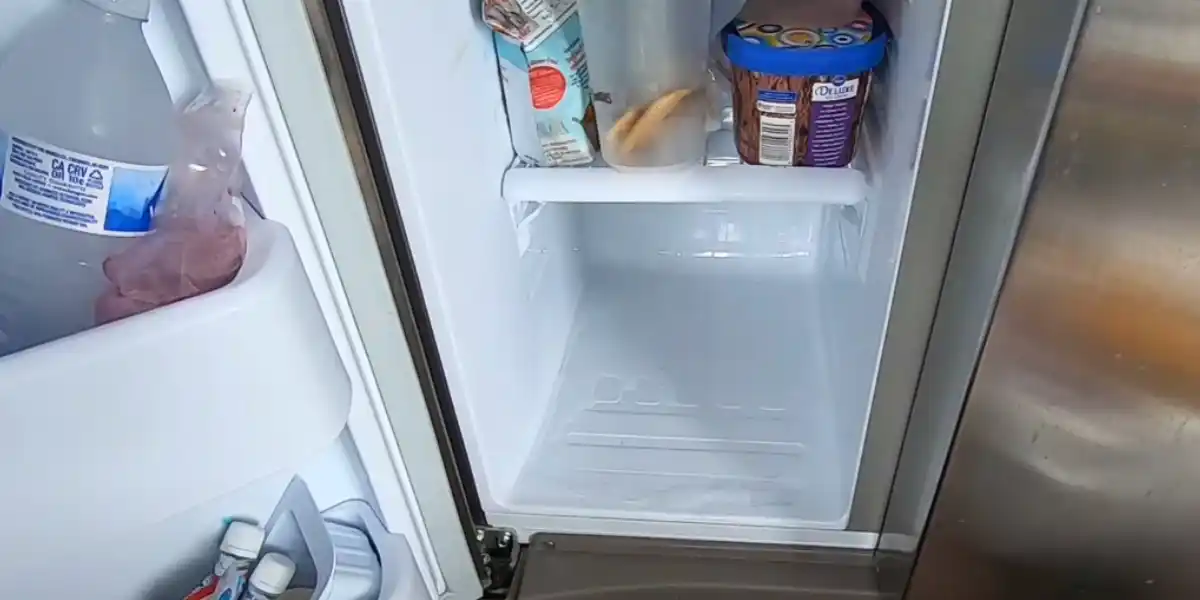
Sheet Of Ice In Bottom Of Freezer Samsung
Ice formation at the bottom of your Samsung freezer can occur when the door isn’t fully closed, allowing cool air to mix with warm, humid air from outside.
Ensure proper cool air circulation throughout all compartments by checking door seals and ventilation to prevent ice buildup.
Common Causes Of Ice Formation In The Bottom Of Samsung Freezers
Faulty Door Seals
If your Samsung freezer door seals aren’t working right, you’re in trouble. Think of these seals as guards. They keep warm, moist air out of your freezer.
If they’re broken or worn out, that warm air slips inside and becomes ice. Check these seals often. If they look damaged, it’s time for new ones.
Inadequate Ventilation
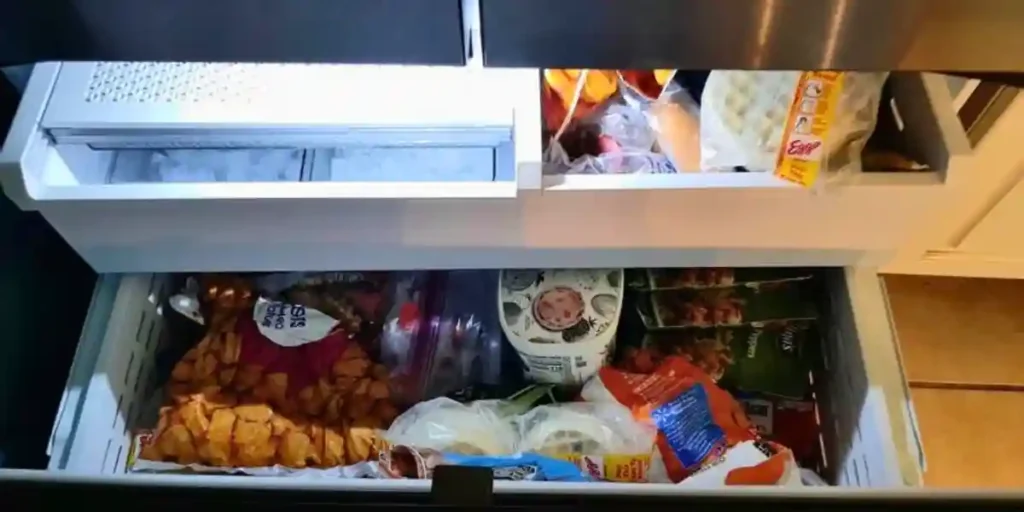
Ventilation is like the lungs of your freezer. It keeps the cold air moving. But if something’s blocking the vents, the air gets stuck.
This can cause cold spots where ice forms. Make sure nothing’s blocking the vents. Good airflow equals less ice.
Excessive Humidity
Humidity is just a fancy word for dampness in the air. Too much of it can cause problems.
If your freezer is near a damp place or an open window, it might suck in that moist air. This can lead to more ice. Try to keep your freezer in a dry, cool spot.
Overloading the Freezer
Packing your freezer too full can also cause ice. It’s like stuffing a closet. The cold air can’t move around.
This can lead to uneven cooling and ice. Make sure you give your food some room to breathe!
Warm Food Placement
Hot food in a freezer can be a recipe for ice. It’s like when you see a cold drink “sweat” on a hot day.
That’s condensation. And in your freezer, it can turn into ice. Always let hot food cool down before you put it in the freezer.
Defective Defrost System
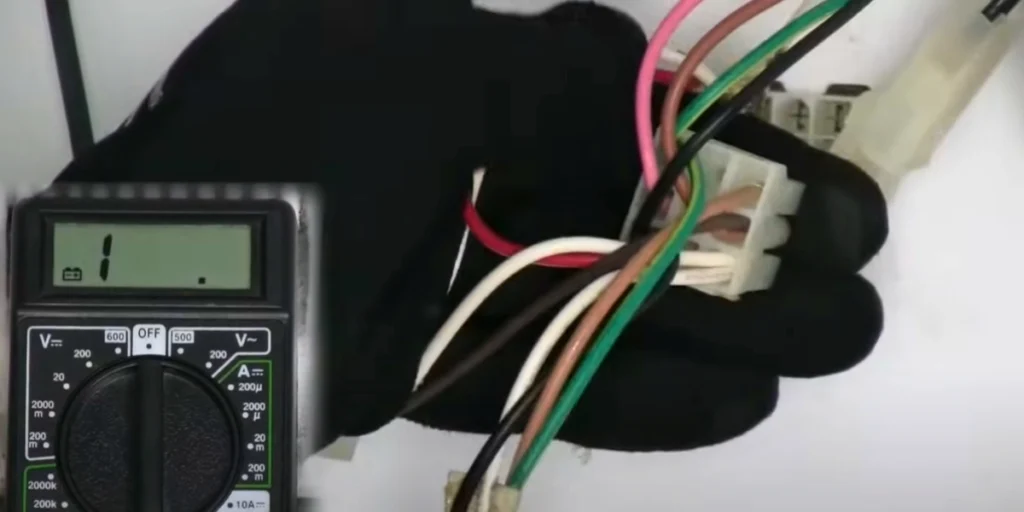
Your freezer has a built-in defrost system. It’s like a tiny ice-removing machine. But if it’s broken, it can’t do its job.
This leads to more ice. If you think your defrost system might be the problem, it’s time to call in a professional.
Improper Temperature Settings
Temperature settings can be tricky. If they’re too low, you might end up with a freezer full of ice. The temperature inside your freezer should always be 0°F (-18°C).
Infrequent Defrosting
Finally, remember to defrost your freezer. It’s like giving it a good clean-out. If you don’t do this regularly, ice will slowly build up.
Steps To Defrost or Remove Ice Sheet From The Bottom Of Samsung Freezer
Step 1: Gather the Required Tools
Before you begin, you need to assemble a few tools. A hairdryer, towels, and a plastic scraper will come in handy.
Don’t worry; you probably have these around the house already.
Step 2: Unplug Your Freezer
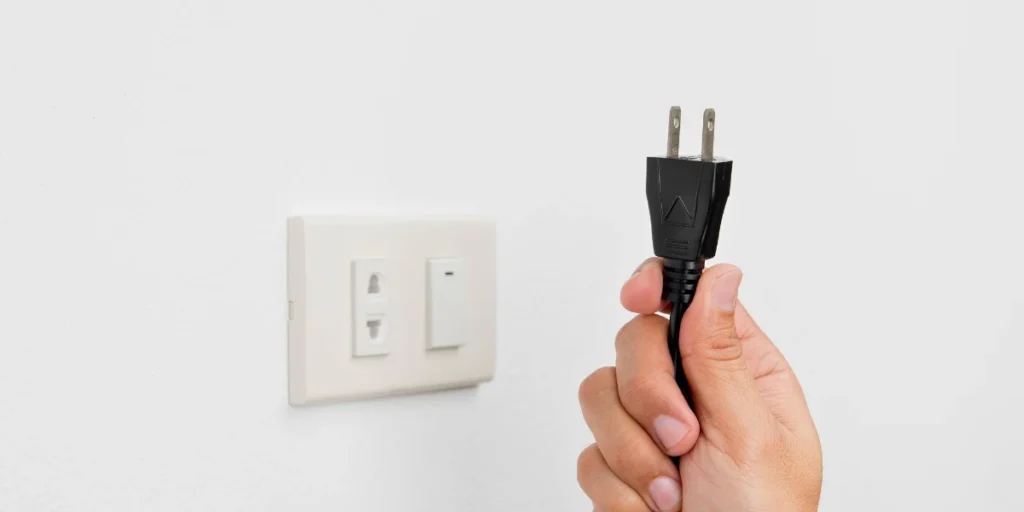
Next, find the cord that gives the freezer its power. It’s usually behind the freezer. Carefully pull the plug out of the wall. This makes sure you stay safe and don’t get shocked.
Step 3: Empty the Freezer
Open the freezer door. Take everything out of it. This includes food, ice trays, and any containers. Put them in a cooler or another fridge. This keeps them cold while you work.
Step 4: Start the Defrosting Process
Grab your hairdryer. Turn it on. Point it at the ice. This will make the ice start to melt, just like when the ice cream melts in the sun.
Hold it close, but not too close. We don’t want to hurt the freezer.
Step 5: Lay Down Towels
Towels are great for cleaning up water. Put them on the floor around the freezer. As the ice melts, water will drip down. The towels will soak up the water like a sponge.
Step 6: Scrape the Ice
Time to use the plastic scraper! Take it and gently push it under the ice. Think of it like you’re scooping ice cream. Lift the ice out and place it in a sink or bowl.
Step 7: Keep Melting and Scraping
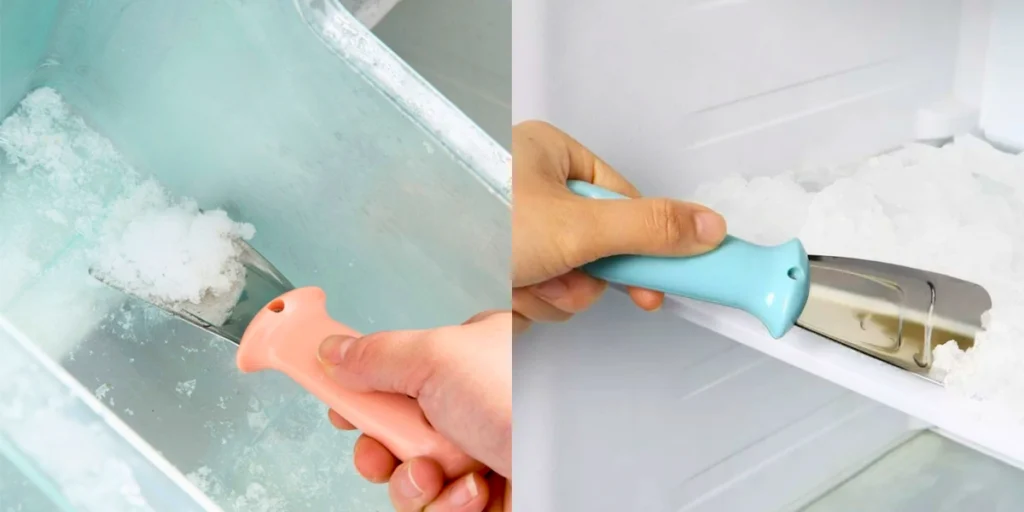
You might not get all the ice in one go. That’s okay. Just use the hairdryer some more, and then scrape again. It’s like a game: melt, scrape, repeat!
Step 8: Dry Out the Freezer
Once all the ice is out, it’s time to dry. Use a clean towel to dry off the inside of the freezer thoroughly. This step is crucial to prevent future ice build-up.
Step 9: Plug In and Reload the Freezer
Now that your freezer is dry and ice-free plug it back in. Give it some time to reach the correct temperature. Then, return your items to the freezer.
Preventing Ice Buildup: Tips For Proper Freezer Maintenance
Maintain the Right Freezer Temperature
The temperature inside your freezer should always be 0°F (-18°C). It’s the ideal temperature to keep your food safe.
By using a thermometer, you can check your freezer’s temperature. A freezer thermometer isn’t expensive and is easy to use.
Defrost the Freezer Regularly
Sometimes, your freezer may get icy walls. That’s when you need to defrost it. It’s a simple process. First, you need to remove all the food from your freezer.
Then, you unplug it from the wall. Now, you wait for the ice to melt. To make this faster, you can put hot water in bowls and put them in the freezer.
After the ice melts, wipe it dry with a towel.
Fill Up Your Freezer
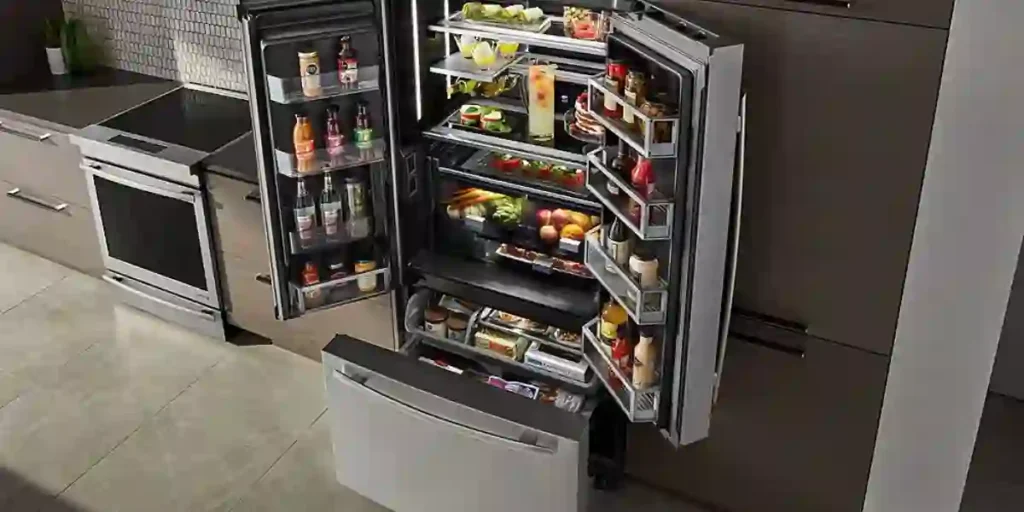
Your freezer works best when it’s almost full but not quite. When it’s about three-quarters full, it’s just right. If you don’t have enough food, that’s okay.
You can use containers filled with water instead. That’ll help your freezer stay at the right temperature and won’t cause extra ice.
Check the Door Seals
The rubbery part around your freezer door is called a seal. It helps keep the cold air inside. If it’s not working properly, your freezer will have to work extra hard.
That could cause more ice. So, always check your door seal for any damage. You can do this by trying to slide a piece of paper through it. If it goes through easily, it’s time for a new seal.
Cover All Foods
Never put uncovered food in the freezer. It causes extra frost and can make your freezer smell bad.
Instead, put your food in airtight containers or special freezer bags. Make sure they’re sealed tightly.
Don’t Put Hot Food in Freezer

If you’ve cooked something and have leftovers, wait before you put it in the freezer. Hot food can make the freezer warm.
Then, the freezer has to cool down again. This makes extra ice. Wait until the food has cooled down, then freeze it.
Clean Your Freezer Often
Cleaning your freezer helps stop ice buildup. Every three to four months is a good time frame. For cleaning, you turn off the freezer and remove all the food.
Then, you wipe it with warm water and baking soda mix. This mix is good for removing stains and bad smells. After that, make sure to dry your freezer thoroughly.
Give Your Food Some Room
Your food needs some space in the freezer. If it’s too crowded, the cold air can’t flow properly.
This can cause ice buildup. Also, make sure not to block the freezer’s vents with food. This will help the cold air move around more easily.
FAQs
Is The Ice Sheet Damaging My Samsung Freezer?
How Can I Prevent The Ice Sheet From Forming Again In My Samsung Freezer?
Is It Normal For Samsung Freezers To Have Ice Sheets At The Bottom?
Will The Warranty Cover The Repair Costs If There’s An Ice Sheet In My Samsung Freezer?
Conclusion
If you see a layer of ice in the bottom of your Samsung freezer, don’t worry!
This is usually because the door seals are not working right, the temperature is not set properly, or the vents are blocked. You can do a few things to stop the ice from building up.
Firstly, you should defrost your freezer regularly. You should turn it off and let all the ice melt occasionally.
Secondly, make sure your freezer is set at the right temperature. Too cold, and you’ll get more ice.
Lastly, always keep your freezer clean. If dust and dirt block the vents, your freezer might get too cold, and ice could build up. So, keeping it clean helps to prevent this problem.